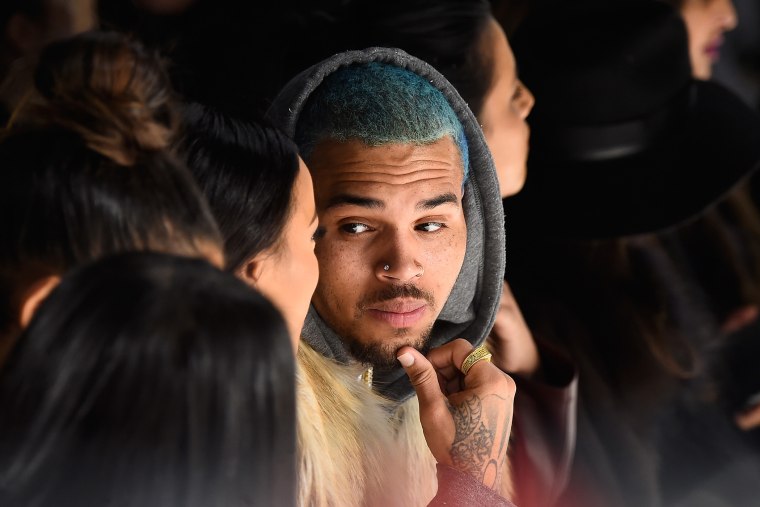Controversial R&B star Chris Brown was the number one trending topic on Twitter early on Wednesday after posting a series of tweets on the subject of suicide in the aftermath of 20-year-old singer Kehlani Parrish's alleged recent attempt on her own life.
Although Brown never mentioned Parrish by name, several users interpreted his remark — “There is no attempting suicide. Stop flexing for the gram. Doing s--- for sympathy so them comments under your pics don't look so bad” — as an indirect insult of the singer, who is currently recuperating.
Brown, who became something of a cultural lightening rod following a domestic abuse incident involving his former girlfriend Rihanna in 2009, has had his fair share of social media meltdowns in the past (including a homophobic rant in 2010 that resulted in a public apology from the "Look at Me Now" singer), but his comments on suicide arguably could set back an important conversation that has been brewing in communities of color about the internal stigma regarding mental health.
RELATED: Chris Brown investigated by Las Vegas PD for alleged battery, theft
"It's extremely destructive because a lot of people, when they have suicidal thoughts, they're usually told that they're selfish and trying to get attention, and that's just not the case," Dior Vargas, a Latina feminist and mental health activist, told MSNBC on Wednesday. "When you are in a deep suicidal episode, you just want the pain to stop."
Vargas, who survived a suicide attempt herself a decade ago, started a photo project that seeks to create a safe space for people of color who have struggled with depression and other mental health challenges. It gives them a chance to have their voices heard and know that they are not alone. "I know what it is to feel like you don’t have any other options other than to end your life," she said.
In Vargas' experience, members of the African-American community have told her that they've been made to feel like they should be undaunted by depression, in part since their ancestors survived the legacy of slavery. She fears that Brown is only perpetuating a dangerous premise that mental problems translate into some form of inherent "weakness."
"If you're a regular person or a celebrity, this is something that is real and it should be acknowledged," she said.
However, that is easier said than done when historically there is a deep-seeded mistrust in some African-American circles to the medical community, which arguably could be traced back to forty years of racially-motivated experiments at Tuskegee University in Alabama. Faith also plays a role, with some religious-minded African-Americans making the case that people with mental issues should find solace in the sanctuary — not the psychiatrist's office.
"There are so many strikes against people of color that you don't dare speak about anything related to mental health because it just means you're 'crazy,'" Terrie M. Williams, the author of "Black Pain: It Just Looks Like We’re Not Hurting," and one of the foremost experts on the subject of mental illness in the black community, told MSNBC on Wednesday. Williams even recalls knowing a black woman who would give fake excuses when going to therapy appointments during work, whereas for her white colleagues, seeking help for mental health purposes was a "badge of honor."
She believes that the more people who speak out about their condition, like Parrish did, the more open-minded the black community will be, but of course there are many societal factors contributing to the silence that often greets mental health issues among some African-Americans. The lack of educational resources and good jobs, coupled with a culture that routinely marginalizes and negatively stereotypes young black men in particular has created a toxic environment, and recent studies have shown suicides among African-American male youth are on the rise.
"I would say that the most difficult job in America is to be a black man, and especially a dark-complexioned black man, because you're considered more intimidating," Williams said. "Just walking down the street people are afraid of you."
According to actress and social activist Madeline McCray-Matz, this can create a culture of hopelessness and a sense of "what's the point?"
"There is a great need for people to become more knowledgeable about the solution. We can see the problem, it's very visible growing up in a patriarchal society, where men are being misled about what it means to be a man. And for women ... it's whether or not you should be able to express yourself without being condemned," she told MSNBC on Wednesday. She believes that Brown's comments are reflective of that pathology, but also his own.
"Chris Brown was abused, had a horrible upbringing," she said, referring to his own admissions of domestic violence perpetrated by his stepfather during his youth. "If you're abused as a child, your development and your well being is compromised." Even if she considers his Twitter tirade "damaging," there needs to be an emphasis on communication, not condemnation. "People are still intimidated by how to address it," she added.
For her part, Williams makes a conscious effort to greet black men she sees on the street with a smile. "Sometimes they don't even know what to do with that," she said. "Generally young [black] boys and men are taught early on to not cry, to not show emotion." Her hope is that if people begin to approach people in crisis with a "what happened to you?" attitude instead of a "what's wrong with you?" one, it might start to make a difference.
"I think that it's a very uncomfortable topic so people are immediately ready to point fingers. There are a lot of 'shoulds,' and I think there is a lack of empathy because we don't want to put ourselves in those people's shoes. We make it very an 'us vs. them' situation," added Vargas. "People need to be more compassionate."
